There were slightly fewer reviews of books that drew attention to diversity this month (perhaps everyone bustled out into the sunshine at the end of winter!) but the quality of reviews was just as good.
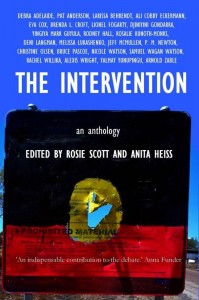 Elizabeth of Devoted Ecletic penned her thoughts on Anita Heiss and Rosie Scott’s The Intervention anthology, a collection of works written in response to the government’s heavy- and high-handed control in the Northern Territory following the ‘Little Children Are Sacred Report.’
Elizabeth of Devoted Ecletic penned her thoughts on Anita Heiss and Rosie Scott’s The Intervention anthology, a collection of works written in response to the government’s heavy- and high-handed control in the Northern Territory following the ‘Little Children Are Sacred Report.’
Amazingly, major publishers turned the book down because they didn’t think they could market it, even though it had a stellar line up of established thinkers and writers, including Melissa Lucashenko, Alexis Wright, Larissa Behrendt, Eva Cox and Tara June Winch.
Elizabeth cites Rosie Scott’s launch speech, in which she relates the power of language to express reality and its wrongs, and to compel readers to respond. From the quotes of writers that follow in her review, the trauma and lack of consultation show the complete lack of reason in the government’s approach. As Elizabeth writes, ‘Reading The Intervention, it’s hard not to conclude that, rather than solving the problems faced by remote Indigenous communities, the government’s actions have compounded them.’
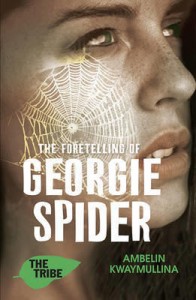 Just as Alexis Wright used The Swan Book as a creative vehicle for expressing her thoughts on the intervention and on colonisation, so too has Ambelin Kwaymullina drawn on Indigenous identity and experiences in her young adult speculative fiction series, The Tribe. It’s exciting that her third and final volume, The Foretelling of Georgie Spider, is now out. It was reviewed by Elizabeth of Earl Grey Editing, who wrote:
Just as Alexis Wright used The Swan Book as a creative vehicle for expressing her thoughts on the intervention and on colonisation, so too has Ambelin Kwaymullina drawn on Indigenous identity and experiences in her young adult speculative fiction series, The Tribe. It’s exciting that her third and final volume, The Foretelling of Georgie Spider, is now out. It was reviewed by Elizabeth of Earl Grey Editing, who wrote:
‘The series tackles diversity and humanitarian issues with maturity, unafraid to ask difficult questions. It holds particular relevance for Australia, given the Government’s current stance on human rights, and highlights some very unflattering aspects of Australian culture. However, it still manages to do so with sensitivity and hope.’
There were a handful of reviews of books by white authors that have Indigenous characters. Jennifer of GoodReads reviewed the first two books from Eleanor Dark’s The Timeless Land trilogy, The Timeless Land and Storm of Time. She originally read the books in the 70s and they were the first she’d read ‘that tried to look at the European settlement in 1788 from both an Aboriginal and European perspectives.’ Rereading it reminded her ‘of the joy I found in reading it the first time, my sense that Eleanor Dark had captured something of the mystery of the land, as well as a sense of the impact of European arrival on both Europeans and Aboriginals.’
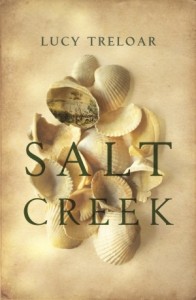 To my shame, I haven’t read any of Dark’s novels, and I’m adding these to my list for reading. I wonder too how they compare to early contact novels such as Kim Scott’s That Deadman Dance. In a similar (but more contemporary) vein to Dark’s works is Lucy Treloar’s Salt Creek, about a family that takes up land in the Coorong region of South Australia, which belongs to the Ngarrindjeri people. The Finch family’s lives become inextricably bound with the Ngarrindjeri people’s through Tully, who becomes their friend. Jennifer of GoodReads ‘found it a haunting story, almost unbearably sad at times, and beautifully written. While some elements can be predicted, others have an element of surprise’ while Brenda, also of GoodReads, sums it up thus: ‘Written in a quiet yet consequential manner, Salt Creek kept me in its grip all the way to the end’. I, too, gulped this novel down because I was desperate to find out what happened.
To my shame, I haven’t read any of Dark’s novels, and I’m adding these to my list for reading. I wonder too how they compare to early contact novels such as Kim Scott’s That Deadman Dance. In a similar (but more contemporary) vein to Dark’s works is Lucy Treloar’s Salt Creek, about a family that takes up land in the Coorong region of South Australia, which belongs to the Ngarrindjeri people. The Finch family’s lives become inextricably bound with the Ngarrindjeri people’s through Tully, who becomes their friend. Jennifer of GoodReads ‘found it a haunting story, almost unbearably sad at times, and beautifully written. While some elements can be predicted, others have an element of surprise’ while Brenda, also of GoodReads, sums it up thus: ‘Written in a quiet yet consequential manner, Salt Creek kept me in its grip all the way to the end’. I, too, gulped this novel down because I was desperate to find out what happened.
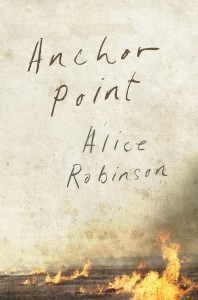 Alice Robinson’s Anchor Point is one more novel that explores the intertwining of settler and Aboriginal relationships to the land, as Sue of Whispering Gums writes in her thoughtful review:
Alice Robinson’s Anchor Point is one more novel that explores the intertwining of settler and Aboriginal relationships to the land, as Sue of Whispering Gums writes in her thoughtful review:
‘The other important land issue for farmers – indigenous people and their relationship with the land – is also a thread, introduced early on via Laura’s school friend, the indigenous boy Joseph. This issue is not laboured but bubbles along underneath, coming to the surface in 2018 when Joseph reappears as a man asking for occasional access to the farm for his people.’
This book also deals with issues such as Alzheimer’s and climate change but not, it seems, in an overt way – the sign of an accomplished writer.
 I was delighted to see a new book by Tasmanian author Kathryn Lomer, Talk Under Water, and even more excited to find that it had a deaf character. Summer uses sign language, and meets Will in Kettering, a small Tasmanian coastal community. Glaiza of Paper Wanderer enjoyed the book although, as she writes, ‘This isn’t an action packed YA story driven by a burning source of conflict so it took me a little while to adjust to a slower pace.’
I was delighted to see a new book by Tasmanian author Kathryn Lomer, Talk Under Water, and even more excited to find that it had a deaf character. Summer uses sign language, and meets Will in Kettering, a small Tasmanian coastal community. Glaiza of Paper Wanderer enjoyed the book although, as she writes, ‘This isn’t an action packed YA story driven by a burning source of conflict so it took me a little while to adjust to a slower pace.’
Reviews of books by authors of diverse heritage also appeared. Orange Pekoe Reviews picked up Maxine Beneba Clarke’s Foreign Soil, and ‘never thought a short story collection could be such a page turner’!
Sue of Whispering Gums reviewed Home after Dark by Fijiindian Australian, Kavita Nandan. This is a story about the coups in Fiji, a couple’s unhappy marriage, and the effect of migration on families. ‘It is in this theme of dislocation and loss,’ Sue writes, ‘rather than in the story of a relationship, that Nandan’s heart is clearest, her hand surest.’ The work’s uneven treatment compelled her to wonder why some novelists chose write in fiction, and other in non-fiction.
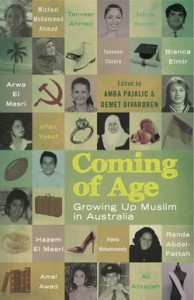 Brona of Brona’s Books read Coming of Age: Growing Up Muslim in Australia. The contributors of this volume range from ‘football stars to female kickboxers, established authors, activists, lawyers and even a Miss World Australia’, and half of them were women, hence Brona’s review for AWW. She found it a ‘fascinating, challenging and sometimes surprising book’ which prompted her to ask ‘Can we empower children to not only stand up for themselves against bullies and harassment, but to stand up for others? How can we promote tolerance, empathy and social justice?’ Listening to voices such as those in this book, she notes, can help us become a more tolerant society. I would argue that this also holds for all books that have diverse voices.
Brona of Brona’s Books read Coming of Age: Growing Up Muslim in Australia. The contributors of this volume range from ‘football stars to female kickboxers, established authors, activists, lawyers and even a Miss World Australia’, and half of them were women, hence Brona’s review for AWW. She found it a ‘fascinating, challenging and sometimes surprising book’ which prompted her to ask ‘Can we empower children to not only stand up for themselves against bullies and harassment, but to stand up for others? How can we promote tolerance, empathy and social justice?’ Listening to voices such as those in this book, she notes, can help us become a more tolerant society. I would argue that this also holds for all books that have diverse voices.
And that’s all for this month! Next month we have a focus on lesbian/queer women writers, and will have guest posts from four wonderful Australian women writers. If you’d like to look up some books by lesbian/queer writers, or any other diverse writers, you can head to our lists on the Diversity page.
About Me
 I’m Jessica White, a novelist and researcher, and I’ve been deaf since age 4 when I lost most of my hearing from meningitis. I have a PhD from the University of London and have published two novels with Penguin, A Curious Intimacy (2007) and Entitlement (2012). I’m working on a book of non-fiction about Rosa Praed and her deaf daughter Maud, as well as my third novel, The Sea Creatures, which won funding through the Australia Council’s Artists With Disability program. You can find more information about me at my website. I’m also on Twitter @ladyredjess.
I’m Jessica White, a novelist and researcher, and I’ve been deaf since age 4 when I lost most of my hearing from meningitis. I have a PhD from the University of London and have published two novels with Penguin, A Curious Intimacy (2007) and Entitlement (2012). I’m working on a book of non-fiction about Rosa Praed and her deaf daughter Maud, as well as my third novel, The Sea Creatures, which won funding through the Australia Council’s Artists With Disability program. You can find more information about me at my website. I’m also on Twitter @ladyredjess.






Love your write-ups Jessica – or have I said this before? Thanks for the links.
I loved orange pekoe’s comment that she never thought a book of short stories could be a page turner! I wish more people would appreciate that short stories can be so!
Thank you Sue – they take a long time to write so I’m glad there are appreciative readers. I enjoy short stories but I’m not so good with reading them in books – I have to put the book down each time I’ve finished a story because I get too invested in the characters. I prefer to read them in journals mixed up with other types of writing Fussy, I know!
Somehow I’m going to have to add Dark’s trilogy and Anchor Point to my TBR wishlist – they sound like my kind of story.
Thanks for the great round up and the shout out 🙂
You’re welcome, Broana 🙂 And yes, I had to add those books to my list too!